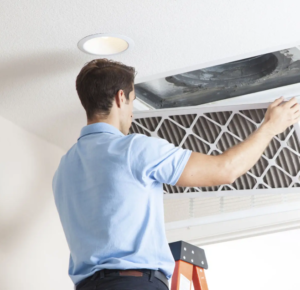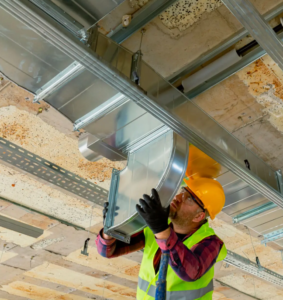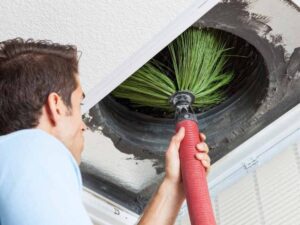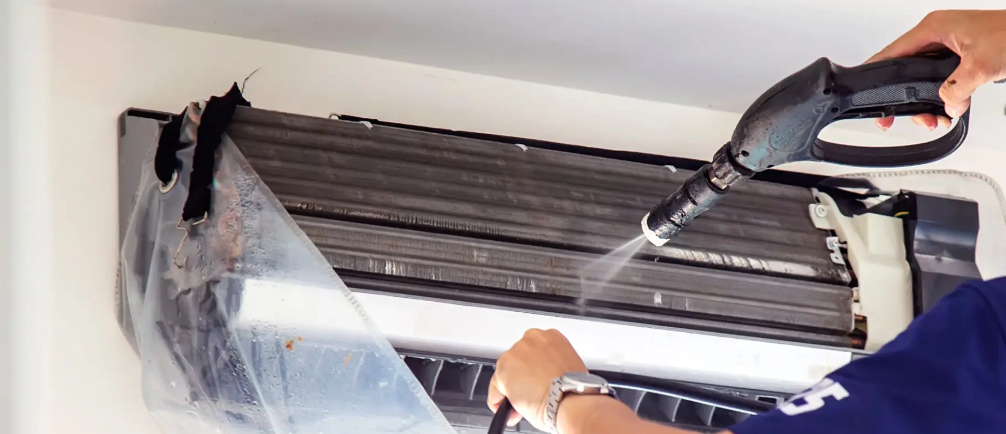HVAC systems, often overshadowed by the more immediate concerns of home maintenance, hold a pivotal role in ensuring a comfortable and healthy indoor environment. They bring a unique blend of functionality and necessity to the table, distinguishing themselves as an essential component of modern living. Central to this system’s appeal is its ability to regulate temperature, filter air, and maintain indoor air quality, making it indispensable in both residential and commercial settings.
Key components of an HVAC system include the furnace, air conditioner, ductwork, and thermostats, each contributing to the overall performance and efficiency of the system. The air filters within play a particularly crucial role, offering a first line of defense against airborne contaminants. Delving deeper, each part of the HVAC system presents its own maintenance needs, operational nuances, historical development, and tips for optimal performance.
The forthcoming sections will shed light on these aspects in detail, enhancing your understanding of how to maintain and clean your HVAC system effectively, thereby ensuring its longevity and reliability. This exploration will not only highlight the system’s technical attributes but will also underscore its significance in fostering a safe, comfortable, and energy-efficient living space.
What is an HVAC system?
An HVAC system, standing for Heating, Ventilation, and Air Conditioning, is a comprehensive solution designed to regulate the climate within a building or home. It works to provide comfort by heating or cooling the air and ensures good indoor air quality through proper ventilation. This system is composed of various components including a furnace for heating, an air conditioner for cooling, ducts that distribute the air, and thermostats to control the temperature.
Each part plays a critical role in maintaining a comfortable and healthy indoor environment, making the HVAC system a key element in both residential and commercial settings. By understanding its function and importance, homeowners and business owners can better appreciate the need for regular maintenance and cleaning to keep their HVAC systems running efficiently and effectively.
Read more: What is HVAC?
Why clean your HVAC systems?

Cleaning your HVAC system is essential for several compelling reasons. Firstly, it significantly improves indoor air quality, making the air you breathe healthier and free from pollutants. This is especially important for individuals with allergies or respiratory issues.
Secondly, a clean system operates more efficiently, which can reduce energy costs noticeably. When the system doesn’t have to work as hard to circulate air, it uses less energy, leading to lower utility bills. Lastly, regular cleaning and maintenance can extend the lifespan of the system substantially.
Dirt and debris can cause wear and tear on the system’s components, leading to costly repairs or even early replacement. By keeping the system clean, you ensure it operates smoothly for a longer time, maximizing your investment.
To improve indoor air quality significantly
Regularly cleaning your HVAC system removes dust, allergens, and other pollutants from the air, leading to a healthier indoor environment. This is crucial for those with allergies or asthma, as clean air can significantly reduce symptoms and improve overall health.
To increase system efficiency and reduce costs
A clean HVAC system doesn’t have to work as hard to heat or cool your home, making it more efficient. This efficiency translates to reduced energy usage and, consequently, lower utility bills. Keeping your system clean ensures it runs optimally, saving you money in the long run.
To extend the lifespan of the system substantially
Dirt and debris can cause premature wear and tear on HVAC components, potentially leading to expensive repairs or the need for early replacement. Regular cleaning helps prevent this, ensuring your system operates smoothly for a longer period and providing a better return on your investment.
When to clean your HVAC system?
Determining the right time to clean your HVAC system is key to maintaining its efficiency and extending its life. Every 3-5 years is a general guideline for routine maintenance, ensuring the system remains free of dust and debris. However, specific circumstances might necessitate more frequent cleanings.
For instance, if visible mold is present, it’s crucial to clean the system immediately to protect your health. Likewise, following any construction or renovation work, cleaning is essential to remove any accumulated dust and debris that can clog the system. These measures not only safeguard the system’s functionality but also contribute to a healthier living environment.
Every 3-5 years for routine maintenance
To keep your HVAC system running smoothly, it’s recommended to perform a thorough cleaning every 3-5 years. This routine maintenance helps ensure that your system operates efficiently, preventing unexpected breakdowns and extending its overall lifespan.
When visible mold is present for health
If you notice visible mold within your HVAC system, immediate cleaning is essential. Mold can pose serious health risks, especially to those with respiratory conditions or allergies. Cleaning the system as soon as mold is detected helps protect your indoor air quality and your health.
After construction or renovation to remove debris
Construction or renovation projects can generate a significant amount of dust and debris that may find its way into your HVAC system. Cleaning the system after construction or renovation is crucial to remove this debris, ensuring that your HVAC continues to function efficiently and circulate clean air throughout your space.
Preparing to clean your HVAC system

Before diving into cleaning your HVAC system, it’s crucial to prepare adequately to ensure safety and effectiveness. Turning off the power to the system is the first and most important step, in preventing any accidents or damage. Next, gather all the necessary tools and materials you’ll need for the cleaning process.
This includes a vacuum with a brush attachment for dust and debris, soft brushes for delicate components, and appropriate cleaning solutions. Having everything on hand before you start will make the cleaning process smoother and more efficient. This preparation not only safeguards you but also ensures that the system is cleaned thoroughly without causing any harm to its components.
Turn off the power for safety
Before starting the cleaning process, it’s essential to turn off the power to your HVAC system. This safety measure prevents any electrical accidents and protects both you and the system’s components during cleaning.
Gather necessary tools: vacuum, brushes, cleaning solutions
Having the right tools at hand is key to effectively cleaning your HVAC system. You’ll need a vacuum with a brush attachment to remove dust and debris, soft brushes to clean delicate parts without causing damage, and cleaning solutions suitable for the specific components you’re cleaning. Preparing these tools beforehand ensures a smooth and efficient cleaning process.
Cleaning the HVAC filters
An integral part of maintaining your HVAC system is regularly cleaning the filters. This step is crucial for ensuring the system runs efficiently and the air in your home remains clean. Start by carefully removing the filters from the unit.
For filters that are reusable, vacuum any loose debris before washing them gently with a mild soap solution. Let them dry completely before reinserting them into the system. If your filters are disposable, replace them with new ones that match the correct size and specifications for your system.
This process not only helps in maintaining optimal air quality but also enhances the system’s performance by preventing airflow blockages.
Remove the filters carefully
Begin by carefully removing the filters from your HVAC system. This step is crucial to avoid damaging the filters or the system itself.
Vacuum loose debris from filters
Once removed, use a vacuum with a soft brush attachment to gently remove any loose debris from the filters. This helps clear the bulk of the dust and dirt, making the next steps more effective.
Wash reusable filters with mild soap
For filters that are designed to be reused, wash them gently with a mild soap solution. Ensure they are thoroughly rinsed and completely dry before placing them back into the system.
Replace disposable filters with the correct size
If your system uses disposable filters, make sure to replace them with new ones that are the correct size and type for your specific HVAC unit. This ensures proper fit and function, maintaining the system’s efficiency and air quality.
Read more: Boost Indoor Air Quality with HVAC Filters
Cleaning the HVAC ducts

Cleaning the ducts is a vital part of maintaining your HVAC system’s health and efficiency. Start by inspecting the ducts for any visible signs of dirt, debris, or mold, which can impede airflow and reduce air quality. Using a vacuum with a long hose attachment, carefully remove any accumulation within reach.
For areas that are difficult to access or heavily contaminated, consider hiring a professional cleaning service. They have the tools and expertise necessary to thoroughly clean the ductwork, ensuring your system operates at its best. Regular duct cleaning not only enhances the performance of your HVAC system but also contributes to a cleaner, healthier indoor environment.
Inspect ducts for debris, mold, and damage
Begin by inspecting the ducts thoroughly for any signs of debris, mold, or damage. Identifying these issues early can prevent them from affecting the system’s efficiency and the quality of your indoor air.
Use a vacuum with a long hose attachment
To remove the accumulated dirt and debris, use a vacuum equipped with a long hose attachment. This tool is essential for reaching into the ducts and effectively cleaning out the buildup.
Consider professional cleaning for inaccessible areas
For ductwork sections that are difficult to access or if you encounter significant mold or damage, consider hiring a professional cleaning service. Professionals have the necessary equipment and expertise to safely and thoroughly clean these areas, ensuring your HVAC system operates optimally.
Read more: How to Clean HVAC Ducts and Improve Indoor Air Quality
Cleaning the vents

An essential step in HVAC maintenance is cleaning the vents, which directly impact airflow and quality in your home. Begin by removing the vent covers using a screwdriver, allowing access to the ducts behind them. This is an opportunity to vacuum inside the ducts, removing dust and debris that has accumulated over time.
After vacuuming, wash the vent covers with soapy water to remove any grime or dust. Ensure they are completely dry before replacing them to prevent moisture buildup. Regularly cleaning the vents not only enhances the efficiency of your HVAC system but also contributes to a healthier living environment by reducing potential allergens and pollutants circulating in your air.
Remove vent covers using a screwdriver
Start by removing the vent covers using a screwdriver. This step provides access to the vents for a thorough cleaning.
Vacuum and wash vents with soapy water
After removing the covers, vacuum the vents to eliminate dust and debris. Then, wash the vent covers in soapy water to remove any accumulated grime.
Dry vents thoroughly before replacing
Ensure the vent covers are completely dry before you place them back. This prevents moisture from entering the HVAC system, which could lead to mold growth.
Cleaning the HVAC unit

The final step in maintaining your HVAC system involves a thorough cleaning of the HVAC unit itself. This includes clearing any debris around the unit to ensure unobstructed airflow, which is vital for efficient operation. Inside the unit, gently vacuuming the interior components helps remove dust without causing damage.
Special attention should be given to cleaning the evaporator and condenser coils with a coil cleaner, as these play a crucial role in the system’s cooling process. This comprehensive cleaning not only optimizes the unit’s performance but also contributes to a longer lifespan and improved air quality in your home.
Clean around the unit to ensure airflow
Clearing any debris around the HVAC unit is crucial for maintaining unobstructed airflow. This step ensures the unit operates efficiently and effectively.
Vacuum the interior components gently
Use a vacuum with a soft brush attachment to gently remove dust from the interior components of the unit. This helps to prevent damage while keeping the system clean.
Clean the evaporator and condenser coils with coil cleaner
Apply a specialized coil cleaner to the evaporator and condenser coils. These components are essential for the cooling process, and keeping them clean enhances the system’s performance and efficiency.
After cleaning and maintenance of HVACs
After thoroughly cleaning your HVAC system, it’s important to engage in regular maintenance to preserve its efficiency and prolong its lifespan. Monitoring the system’s performance closely in the days following the cleaning can help identify any issues that may require further attention. Additionally, scheduling regular professional inspections plays a crucial role in maintaining the system’s health.
These inspections can uncover potential problems before they escalate, ensuring your HVAC system continues to operate smoothly and efficiently. This proactive approach not only safeguards your investment but also contributes to a consistently comfortable and healthy indoor environment.
Monitor the system’s performance for improvements
After cleaning, monitor the system’s performance to detect any improvements or identify areas that may need additional attention. This ensures that the cleaning has effectively enhanced the system’s efficiency.
Schedule regular professional inspections for upkeep
To maintain optimal performance, schedule regular professional inspections. These inspections can help identify and address any potential issues before they become significant problems, ensuring the longevity and reliability of your HVAC system.
Have a Professional Inspect and Clean Ducts

While regular homeowner maintenance is crucial for an HVAC system’s health, certain tasks require professional expertise. Having a professional inspect and clean the ducts ensures a comprehensive cleaning that goes beyond what typical household tools can achieve. Professionals like Callidus Air have specialized equipment designed to effectively remove dust, debris, and any potential mold growth within the ductwork.
This level of cleaning not only improves the system’s efficiency but also significantly enhances the indoor air quality of your home. Furthermore, a professional inspection can identify and rectify any damage or issues within the ducts, preventing future problems and ensuring the longevity of your HVAC system. Engaging professional services for duct inspection and cleaning is a wise investment in the maintenance of a healthy and efficient home environment.
Get in touch with us today for a professional HVAC cleaning!
Final Thoughts
Maintaining a clean HVAC system is essential for ensuring efficient operation, extending its lifespan, and providing a healthy indoor environment. Regular cleaning of filters, ducts, vents, and the HVAC unit itself can significantly improve air quality and system performance. While homeowners can perform many of these tasks, enlisting professional help for comprehensive duct cleaning and system inspection can further enhance the benefits.
By following a consistent maintenance schedule and addressing any issues promptly, you can enjoy the comfort and efficiency of your HVAC system for years to come. This proactive approach not only safeguards your investment but also contributes to a healthier, more comfortable living space.

